Profs. Guanghui Wang, Haigang Ren and Longtai Zheng Publish Research "PLK2 disrupts autophagic flux to promote SNCA/α-synuclein pathology" in Autophagy
Parkinson disease (PD) is the second most common neurodegenerative disease following Alzheimer disease (AD), with clinical symptoms of motor, nonmotor, and cognitive deficits, affecting approximately 10 million people worldwide. The deposition of α-synuclein (α-syn) to form Lewy bodies (LBs) and subsequent propagation is a typical pathological phenotype of PD, which is an essential driver of dopaminergic neuronal death. Polo like kinase 2 (PLK2) is an evolutionarily conserved serine/threonine kinase that is more abundant in the brains of all family members and is highly expressed in PD. However, the role of PLK2 in PD and the mechanisms involved in triggering neurodegeneration remain unclear.
Recently, Profs. Guanghui Wang, Haigang Renand Longtai Zheng from College of Pharmaceutical Sciences, Soochow University, in collaboration with Professor Chun-Feng Liu from the Second Affiliated Hospital of Soochow University, have published a research paper titled “PLK2 disrupts autophagic flux to promote SNCA/α-synuclein pathology” in Autophagy (IF14.6).
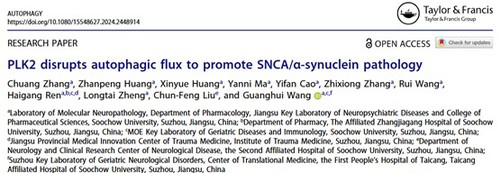
This study reveals that PLK2 regulation of autophagy is critical for pathological α-syn clearance. Overexpression of PLK2 promoted α-syn preformed fibril (PFF)-induced aggregation of wild-type α-syn and mutant α-synS129A. Genetic silence of PLK2 expression or pharmacological inhibition of its activity significantly alleviated α-syn PFF-induced α-syn oligomerization and neurotoxicity. Significantly, PLK2 deficiency in PD mouse models inhibits pathological α-syn aggregation and propagation and protects dopaminergic neurons as well as improves locomotor capacity.Mechanistically, PLK2 blocks autophagy flux by inhibiting autophagosome-lysosome fusion through direct phosphorylation of DCTN1S1098 and results in pathological α-syn degradation deficit and neuronal death.
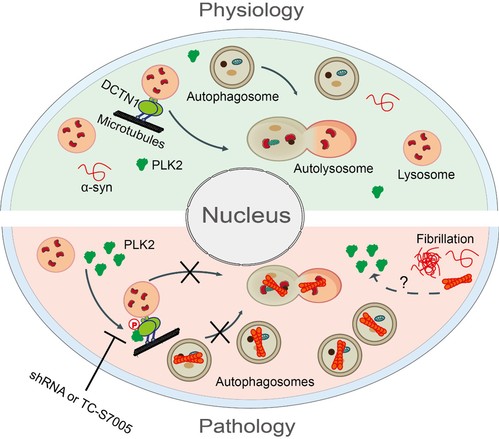
Chuang Zhang, a doctoral student at College of Pharmaceutical Sciences, Soochow University, is the first author of this study. Profs. Guanghui Wang, Haigang Ren,Longtai Zheng and Chun-Feng Liu are co-corresponding authors. The research was supported by the National Natural Science Foundation of China, the Suzhou Key Laboratory of Geriatric Neurological Disorders, and the Priority Academic Program Development of Jiangsu HigherEducation Institutions from Jiangsu Education Department.
Full article: PLK2 disrupts autophagic flux to promote SNCA/α-synuclein pathology
Corresponding authors:
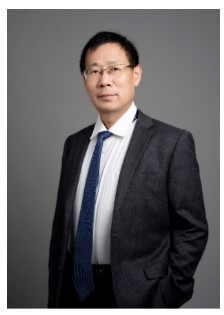
Guanghui Wang is a distinguished professor at the College of Pharmaceutical Sciences, Soochow University. Wang’s laboratory has focused mainly on the molecular basis of neurodegenerative diseases and neurodegeneration in association with neuroinflammation. Over the years, Prof. Wang hassecured more than 15 national projects and published more than 90 academic papers as corresponding author in Sci Adv, Nat Commun, EMBO J, Mol Psychiatry, Autophagy, Aging Cell, Cell Death Differ, Brain, Sci Signal and Cell Rep. To date, these papers have been cited more than 11,500 times.
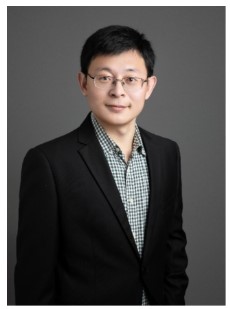
Haigang Ren is a professor at the College of Pharmaceutical Sciences, Soochow University. Dr. Ren focuses on the molecular mechanisms of Parkinson’s disease and neurodegeneration in association with autophagy, mitochondrial dysfunction and neuroinflammation. To date, hehas obtained five National Natural Science Foundation of China (NSFC) projects and published more than 30 academic papers as the corresponding author or first author in Sci Adv, Mol Neurodegener, Sci Signal, Autophagy, Sci China Life Sci, Cancer Lett, J Biol Chem, Acta Pharmacol Sin, Cell Death Dis and Neurosci Bull.
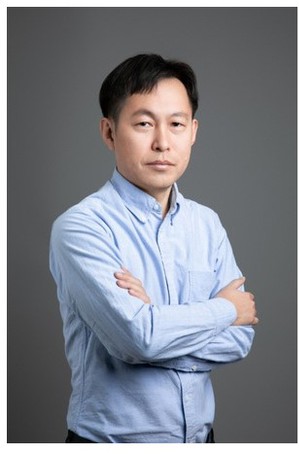
Longtai Zheng is a professor at the College of Pharmaceutical Sciences, Soochow University.His research interests center on the function and mechanism of neuroinflammation in neurodegenerative diseases. Prof. Zheng has secured three NSFC projects and has published more than 30 academic papers as a corresponding author in journals such as Cell Rep, J Neuroinflammation, Brain Behav Immun, J Neurochem and Acta Pharmacol Sin.